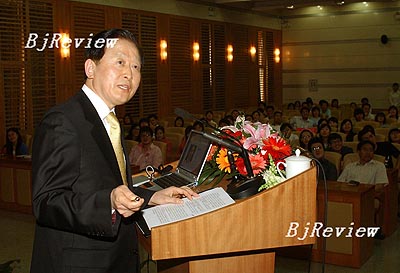
South Korea will invest more in China's hi-tech and capital-intensive sectors as China adjusts its policy on foreign investment, said Kim Ha Joong, South Korea's Ambassador to China.
Kim spoke at a seminar in Beijing on August 8, which marked the 15th anniversary of the establishment of the diplomatic relations between China and the Republic of Korea. Some 100 Chinese and South Korean scholars and representatives attended the seminar co-sponsored by People's Daily Overseas Edition, World Affairs magazine and the South Korean Embassy in Beijing.
"We hope to enhance cooperation in areas that China is interested in, such as cutting-edge technology, information technology, environmental protection and nuclear power," said Kim, when asked about his expectations for South Korea's future investment in China.
Many South Korean companies that had invested in China in the past were small and medium-sized enterprises, most of which focused on the manufacturing sector, Kim said. They came to invest in China simply because of the low labor costs in the country, he added.
Today, as China adjusts its policy on foreign investment, it would be difficult for such companies to make investments in China, Kim said, adding that he expects South Koreans to pump more capital into China's hi-tech and capital-intensive industries. China recently changed some of its foreign investment regulations to attract more money for its hi-tech sector rather than labor-intensive industries.
Despite concerns over overheated investment in China and job loss at home, South Korea's investment in China keeps growing. Kim said he believes an increasing number of South Korean companies will invest in China as long as China does not introduce drastic policy changes.
Addressing imbalances
But things are quite different the other way around. Kim pointed out that while South Korea's investment in China was nearly $35 billion by 2006, China, a country boasting $1.3 trillion in foreign exchange reserves, had invested only $2.2 billion in South Korea.
South Korea's strong competitiveness may be one of the reasons for Chinese investors' reluctance, Kim said. He also noted that South Korea publishes a large number of books on China, giving South Koreans an overall picture of the country. In contrast, the Chinese only have a jumbled knowledge of South Korea from the news media, because few books on South Korea are published in China, he said.
The imbalance in cultural exchanges between the two countries is also exemplified by the popularity of South Korean products, such as soap operas, in China, while Chinese culture has yet to carve a niche in South Korean society, Kim said.
The South Korean and Chinese cultures are quite similar, because the two nations share Confucian philosophy as well as Chinese characters, Kim said.
"As far as I know, there are no restrictions on China's cultural exports to South Korea," he said, when replying to Beijing Review's questions about the imbalance of the two countries' trade in cultural products. "On the contrary, we hope to deepen our cultural exchange with China."
Both South Korea and China are making efforts to introduce their respective cultures to the world, Kim said. If the two countries can cooperate in this field, they will be able to disseminate the fine Oriental culture more effectively and provide an example for the rest of the world, he said.
Kim is also confident about China's investment in South Korea. He believes more Chinese companies will invest in South Korea if they are better informed about the country and its policies on foreign investment.
"When we look at South Korea-China relations, we have to bear in mind that we have only had diplomatic relations for 15 years," Kim said. "I believe more Chinese investments will pour into South Korea in another five or 10 years." | 